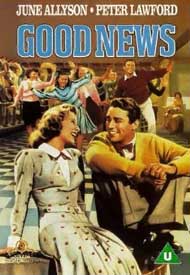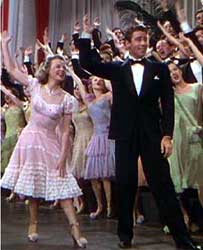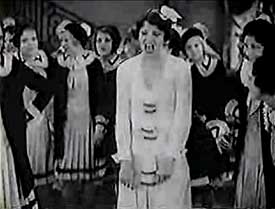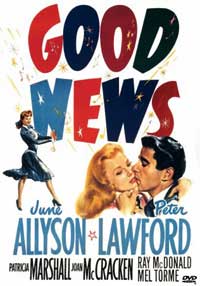 The lighthearted color musical Good News (1947) is supposed to be set on a campus in 1927, the flapper age, but stylistically this 1947 film isn't even close. The idea seems to have been, from the start, to refashion ragtime numbers, some of them veritable classics composed twenty years earlier, to become ad hoc swing tunes.
The lighthearted color musical Good News (1947) is supposed to be set on a campus in 1927, the flapper age, but stylistically this 1947 film isn't even close. The idea seems to have been, from the start, to refashion ragtime numbers, some of them veritable classics composed twenty years earlier, to become ad hoc swing tunes.
For most of the numbers this just doesnt' work. And to be told this is 1927 but seeing swing era clothes & hair-dos would be like launching a movie now about jump-jazz of the 1940s but everyone's wearing granny-dresses & go-go boots, or bellbottoms & tie-dyed t-shirts, with hippy hair-dos.
The title song is performed outdoors on the college grounds, a dreadful rendition by Joan McCracken, surrounded by abominable choreography.
Most but not all the songs are from the 1920s, from a stage musical of the same name. The malt shop choreography improves considerably for the newly written "Indian" song called "Pass the Peace Pipe." But the song itself comes dangerously close to racist.
Peter Lawford sings "Be a Lady's Man" & even if that song hadn't stunk, chances are Peter Lawford would've stunk even so, because in general he always stunk.
Connie (June Allyson) is the girl-next-door type. Pat (Patricia Marshall) is the full-of-herself rival. These wooden characters have the plot-cues built in. thus June Allyson gets to sing a plaintive song about her unfaithful boyfriend ("Just Imagine That It's True"). June could sometimes sing pretty well, but alas for this picture it comes off as caterwauling.
 To the obvious love-triangle plot is added a dumb football hero ingredient of no consequence. But just as it seems likely there's never going to be a story worth telling or a song worth singing by these horrid voices, out comes Mel Torme to do "The Best Things in Life are Free." To the obvious love-triangle plot is added a dumb football hero ingredient of no consequence. But just as it seems likely there's never going to be a story worth telling or a song worth singing by these horrid voices, out comes Mel Torme to do "The Best Things in Life are Free."
Despite that Mel looks like Howdy Doody, in this film he's the only great singer. He turns "Best Things in Life" into a fine number. Lawford sings a bit of it, too, not as badly as when Allyson gives it a try, though in the main both prove indeed it's the singer not the song, as from Lawford's mouth especially the same tune turns to rubbish.
The song that should've been center to this stinky musical is "Varsity Drag." It's a good song & you'd think it couldn't be totally ruined by such a small thing as an appalling arrangement. It's the quintessential ragtime number, but for this film it's just so horribly updated as a '40s swing number with none of its original ragtime verve. There's no singer or dancer to make it work as a swing tune. June & Peter at center guarantees a rotten failure.
June Allyson was always kind of second-string in the musicals, but generally she's a lot more appealing than in this. The metamorphosis of ragtime to swingtime was just such a poor thing to be doing in the first place, & then to saddle poor June with Peter Lawford as her leading man, she just didn't have a chance. Peter's inherently repulsive. Any chance June had to be truly effective is sabotaged by his constant presence.
Still, if there's any reason to suffer through this one, it's for June, & many have called it an underated gem, though to me it fell far short of that. But if there's anyone out there who to my bewilderment actually likes Lawford, then the whole thing might not seem so awful.
 Good News for me was just bad news, surprisingly so since it's a remake of such a charming film of the same name. You'd think some of the original would've carried over, but it didn't.
Good News for me was just bad news, surprisingly so since it's a remake of such a charming film of the same name. You'd think some of the original would've carried over, but it didn't.
The 1930 version had one remarkable element even beyond the fact that it was authentic for its era.
That something truly special was a woman credited as Dorothy McNulty, but better known as Peggy Singleton, whose best known role in the Blondie movies inspired by the comic strip barely hint of her energetic capacity.
She's a flapper commedienne who sang "Good News" in a Betty Boopish manner & invests charm in a song that just has none in the remake. She was an acrobatic tapdancer to boot, riotously funny, followed by "Rubber Legs" Al Norman who's routine is a camp classic.
And although Singleton is not the avowed star of the film, she dominates the two big numbers ("Good News" & "Varsity Drag") & just owns the screen every second she is present. Ragtime is ragtime & the charleston is done right.
The ending of the original version is sadly lost, but as shown on the Turner Network, a set of stills has been added to provide the close.
copyright © by Paghat the Ratgirl
|

